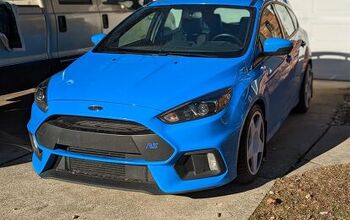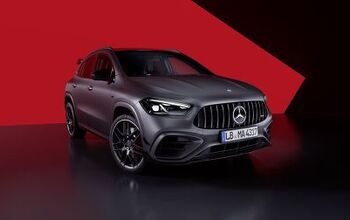Nissan Thinks Recovery Could Begin in Q4 of 2020; Leadership Plots Turnaround

We’ve documented Nissan’s troubles for some time, breaking the situation down into numerous articles expanding upon the various elements that left the brand proclaiming this year’s financial performance will mirror 2019’s lackluster showing months ahead of the latter period’s scheduled reporting.
Everything seemed to go wrong for the company, forcing it to embrace aggressive cost-cutting measures to say afloat. U.S. sales were particularly horrendous going into the pandemic, which only added to the mounting list of hardships. Nissan is now predicting 2020 will be one of the worst financial periods in its history.
However, CEO Makoto Uchida predicts 2021 will be the point where the company finally turns a corner and begins its ascent toward sustained profitability. In fact, he believes that, with a little luck, the rebound might even begin in Q4 of this year. But that unbridled optimism is being tempered by COVID-19. Uchida worries the dreaded “second wave” could forestall Nissan’s recovery by several months.
“We expect to start to recover by Q4,” the CEO explained to Automotive News‘ Daily Drive Podcast. “That is the assumption we are looking at. But of course, we don’t know if a second wave will come. There’s a lot of uncertainty we see in front of us.”
Having endured an operating loss of ¥154 billion ($1.45 billion) in Q2 as revenue was halved, Nissan was hit with the double whammy of restructuring during a period where practically everyone had to stop building and buying cars. That situation wasn’t an anomaly within the industry, of course; the brand formerly known as Datsun just happened to be in a worse financial position than most of its peers.
Ideally, the company would like to see its operating profit margin exceed 5 percent by the start of 2024. That’s when its Nissan Next plan is scheduled to wrap — with an aim to streamline the product portfolio, bring in some more comparative (see: modern) vehicles, and reduce annual operating costs by a sizable $2.82 billion.
Uchida admits his strategy isn’t all that distinct from that of his predecessor, Hiroto Saikawa. Yet the current CEO noted that he’s betting his reputation on pulling this off, and will have more time to put it into action and benefit from the new product that’s predicted to add higher-value transactions. Nissan will continue being a budget-friendly brand, only with more vehicles in its roster that help it see larger returns per model sold.
“The quality of sales direction was set even before my time,” Uchida explained. “But of course, you will not be able to change in three months, six months, one year,” noting that new product would be an essential aspect of the overall recovery plan.
Among those, he referenced the all-electric Ariya crossover (priced around $40,000) by name. Vaguely reminiscent of the hydrogen-powered Hyundai Nexo and every other alternative-energy CUV coming out of Asia, the Ariya takes the best technology Nissan has at its disposal to deliver a more luxurious and upscale experience than the brand’s standard fare. Unfortunately, it drops on North America (after Japan) near the end of 2021. By then, the market will be saturated with similar models — including budget-focused and hardly new inclusions like the all-electric Hyundai Kona. The Korean crossover is already giving fancier models a run for their money and is probably your author’s favorite EV for non-rich people.
More competition is coming soon, with Chevrolet plotting a Bolt-based CUV that should build on its forebear’s already impressive range. Meanwhile, VW has the ID.4 and Ford has the Mach-E, both of which will be sized more similarly to the upcoming Nissan Ariya, with a bunch of premium electric crossovers already trickling out of Europe. Nissan will need to hit a home run with the model to set itself apart. Still, even delivering something competitive would be a step in the right direction (assuming EV adoption continues to improve), proving that the brand is still committed to electrification.
While Nissan assumed China would eventually become its largest market as U.S. sales volumes plateau, the situation has evolved over the last couple of years. Nissan has grown more hesitant to invest within the PRC, abandoning its joint venture with China’s Dongfeng Motor Corporation earlier this year. At the same time, it’s re-examining its prospects in India and is attempting to assess what can be done in North America. Uchida didn’t offer any concrete answers on how Nissan will handle either region, simply saying that the company is actively advancing a plan to lower costs and boost efficiency.
[Images: Memory Stockphoto/Shutterstock; Nissan]

A staunch consumer advocate tracking industry trends and regulation. Before joining TTAC, Matt spent a decade working for marketing and research firms based in NYC. Clients included several of the world’s largest automakers, global tire brands, and aftermarket part suppliers. Dissatisfied with the corporate world and resentful of having to wear suits everyday, he pivoted to writing about cars. Since then, that man has become an ardent supporter of the right-to-repair movement, been interviewed on the auto industry by national radio broadcasts, driven more rental cars than anyone ever should, participated in amateur rallying events, and received the requisite minimum training as sanctioned by the SCCA. Handy with a wrench, Matt grew up surrounded by Detroit auto workers and managed to get a pizza delivery job before he was legally eligible. He later found himself driving box trucks through Manhattan, guaranteeing future sympathy for actual truckers. He continues to conduct research pertaining to the automotive sector as an independent contractor and has since moved back to his native Michigan, closer to where the cars are born. A contrarian, Matt claims to prefer understeer — stating that front and all-wheel drive vehicles cater best to his driving style.
More by Matt Posky
Latest Car Reviews
Read moreLatest Product Reviews
Read moreRecent Comments
- ToolGuy I am slashing my food budget by 1%.
- ToolGuy TG grows skeptical about his government protecting him from bad decisions.
- Calrson Fan Jeff - Agree with what you said. I think currently an EV pick-up could work in a commercial/fleet application. As someone on this site stated, w/current tech. battery vehicles just do not scale well. EBFlex - No one wanted to hate the Cyber Truck more than me but I can't ignore all the new technology and innovative thinking that went into it. There is a lot I like about it. GM, Ford & Ram should incorporate some it's design cues into their ICE trucks.
- Michael S6 Very confusing if the move is permanent or temporary.
- Jrhurren Worked in Detroit 18 years, live 20 minutes away. Ren Cen is a gem, but a very terrible design inside. I’m surprised GM stuck it out as long as they did there.




































Comments
Join the conversation
And not one word regarding finally pulling the plug on Infiniti? Telling, that.
I am not as concerned about CVT acceleration as the longevity of CVTs and their expensive replacement costs especially Jatcos. Jatco transmissions along with Nissan's dismal quality make Nissan products a nonstarter for me.